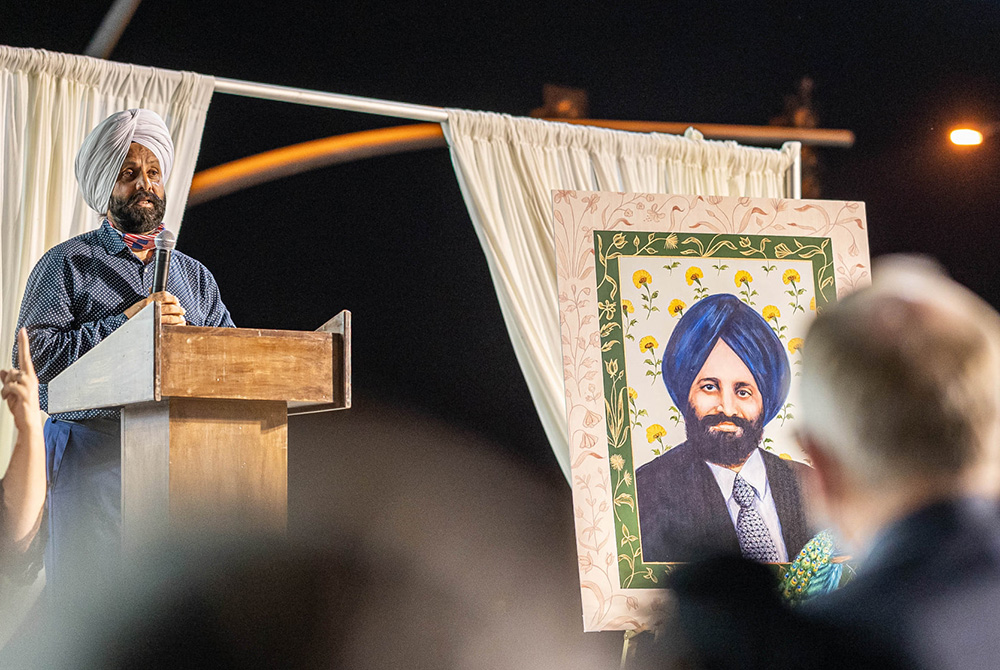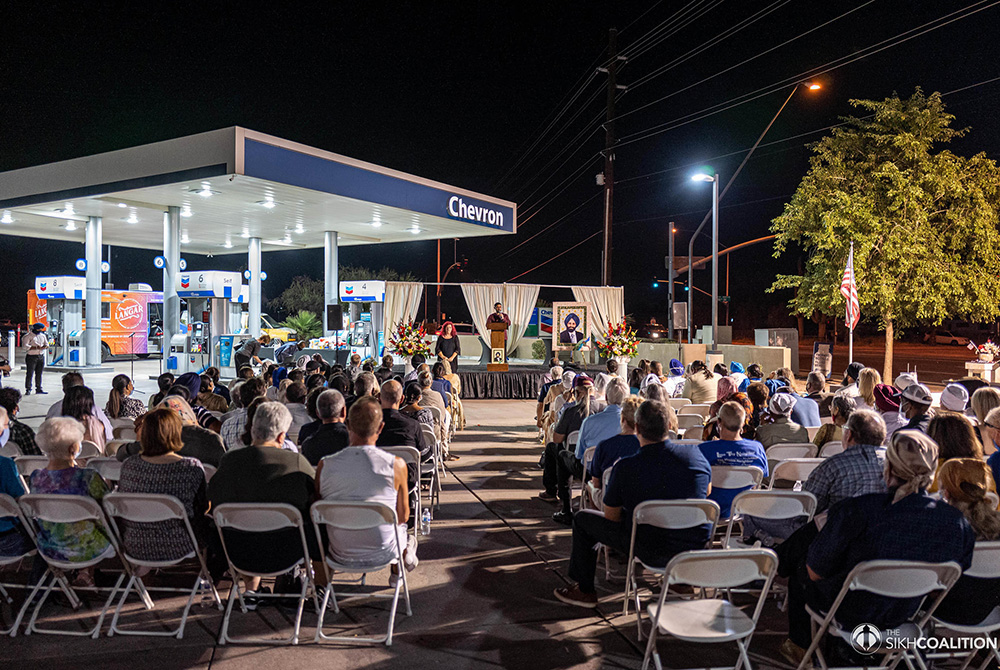
Rana Singh Sodhi speaks during the 20th anniversary memorial for his brother Balbir, Sept. 15 in Mesa, Arizona. Balbir Singh Sodhi was murdered in a hate crime killing days after the terrorist attacks on Sept. 11, 2001. (Photos by Lee Media, Courtesy of the Sikh Coalition)
On Sept. 15, 2021, I gathered on a warm Mesa, Arizona, evening with a few hundred others to honor the memory of Balbir Singh Sodhi, who had been the proud owner of the gas station where we gathered. Twenty years earlier Sodhi, like the rest of our nation, had been traumatized by the horror of Sept. 11. He wanted to do something. He emptied his wallet of $75 into a jar at Costco for the victims of the attack. He bought flowers to plant at his gas station to add beauty even in the hot Arizona sun. He looked for an American flag to display, but the store did not have any more.
Frank Roque also reacted to the shock of Sept. 11, 2001, however, he went looking to "shoot some towel heads." His first and only fatal shooting took place when he pulled up in front of the Chevron station of Balbir Singh Sodhi. Mr. Sodhi was planting flowers at the corner of his gas station. In the Arizona heat, he was using the small bit of exposed dirt to add color.
Roque pulled over to the curb, grabbed his gun, leaned out the car window and shot five times killing Mr. Sodhi instantly. Roque then went on to terrorize others in the Phoenix area that day before being apprehended. Sodhi's life was cut short by the first of a wave of hate crime killings.
This trauma from 20 years ago might have been another opportunity to enhance hate and fear, but Sodhi was a member of the Sikh community, which is committed to a vibrant revolutionary love, to being warriors of peace that strive to break through hate. I had an opportunity to experience this unique type of engagement when I went to Mesa to join in the 20th anniversary memorial.
I found myself nervous about crossing cultures and being a part of a memorial for a man I did not know. I felt awkward in not knowing the customs of the Sikh community. I had said yes in response to the invitation of a Sikh friend, Valerie Kaur, an author, activist and leader of the Revolutionary Love Project. She is striving to make the Sikh power of love a dominant story to help heal our nation and our world. I said yes to her in a Spirit-led moment of generosity — and then I started to second guess myself. What would I say? Why was I going? What did I have to add?

People attend the 20th anniversary memorial for Balbir Singh Sodhi at Sodhi's Chevron gas station Sept. 15 in Mesa, Arizona. (Photo by Lee Media, courtesy of the Sikh Coalition)
As we arrived after sundown at the Chevron station and the site of Balbir Sodhi's murder, I realized that I was walking across a boundary of cultural difference. I realized that I was doing the thing that I talk about — reaching out to understand the other. In theory it is easy, but in practice there is dealing with the self-conscious fear of being insensitive, not knowing, feeling awkward. But I realized that if we really are going to move beyond our own experience and culture we need to be willing to deal with feeling awkward and uncomfortable.
It was in this "encounter," which Pope Francis frequently talks about, that I learned of the Sikh commitment to revolutionary love. I learned that Balbir's brother Rana had come to a place of forgiveness of Roque for his brother's murder. The community made clear that reconciliation was not forgetting. Rather it comes from a place of encounter where both participants acknowledge and lament the wrong done.
Rana walked this path to reconciliation because of his Sikh faith. He said that if he was at odds with another, he was at odds with himself. Reconciliation required him to acknowledge the horror done, and to accept Roque's regret and even perhaps repentance.
Advertisement
At the end of the service, before the langar (traditional ritual meal) each participant was invited to come forward and place a lighted candle and red rose on the marble memorial in the place where Balbir Sodhi died. As we came forward, I was struck by the hundreds of people present, both Sikh and non-Sikh, who were brought together to remember this man and this community's revolutionary love. I was so struck by the fact that I/we treat Jesus' call to love one another in such a pale way. What would happen if we took Jesus' command as seriously as our Sikh brothers and sisters take their call?
As I reflect on the experience, I realize the gift that I received in return for being uncomfortable. I got a glimpse into a vibrant faith that has real consequences. In this time of hyper-partisanship and division, can we cross boundaries in love to find ways to reconciliation? Reconciliation does not mean forgetting. It means being willing to work together for a different future.
In this willingness I came to see Balbir Sodhi as a saint to inspire us to cross boundaries, invest in beauty, reject hate and work to heal divides. In this way we might be able to shift our nation to a better place where we can see beyond difference to the profound truth of our oneness. Perhaps the fruit of risking being uncomfortable is that we can take a step toward healing. May the witness of Balbir Sodhi, his family and the Sikh community strengthen our resolve. For this I pray.
Saint Balbir Sodhi, pray for us.








